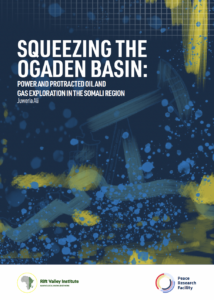SUMMARY
• Ethiopia’s Somali Regional State (SRS) is rich in natural resources, including oil and natural gas reserves in the Ogaden Basin which covers an area of approximately 350,000 sq km comprising much of the SRS. If managed properly and fairly, these resources hold the potential to contribute to development in the regional state and the country at large. Attempts by the federal government to access the SRS’s peripheral resources are, however, bound up in long histories of violence and dispossession.
• The SRS has experienced a relatively stable security climate since late 2018, after the ousting of former regional leader Abdi Mohamoud Omar (‘Abdi Iley’). Beyond integrating representatives of the SRS into the Prosperity Party (PP), promises of
greater political inclusion and economic redistribution made by the incumbent government, have, however, yet to be met when it comes to oil and gas.
• No transparent road map has been provided by the federal government’s Ministry of Mines and Petroleum (MoMP), or the Somali regional leadership, on the government’s plans to resume oil and gas exploration and future extraction in the Ogaden Basin following the 2022 expulsion of Chinese firm Poly-GCL. Meanwhile, long-standing oil and gas exploration has yet to result in extraction and export activities yielding revenues for the SRS and Ethiopia at large.
• Despite some efforts from the PP administration to engage local communities around natural resource governance, there are signs that, more broadly, it is pursuing the practices of its predecessor, the Ethiopian Peoples’ Democratic Revolutionary Front (EPRDF), partly by co-opting community figures to lend legitimacy to its top–down decision-making on oil and gas management.
• Opposition members from the SRS and the diaspora are becoming increasingly outspoken in contesting unaccountable oil and gas exploration by foreign companies, abetted by the state, as well as raising awareness about related social and ecological ills. While this marks an important development in civil society activity in the SRS, it reveals the continuously contested nature of oil and gas exploration. If not adequately addressed through inclusive dialogue by the SRS leadership, it could potentially hamper the promising peace process with the Ogaden National Liberation Front (ONLF) which has in the past demanded greater regional sovereignty and accountability over natural resource exploration and extraction.
• To date, there has been no independent environmental impact assessment (EIA) conducted in the Ogaden Basin, despite environmental and human health concerns. Poly-GCL and other companies have operated as enclaves, with few benefits accruing to the local populace. Exploration agreements such as that signed between the federal government and Poly-GCL have reinforced established hierarchies of socioeconomic exclusion, ensuring employment and contractual prospects remain concentrated among so-called ‘highlanders’—hailing from Ethiopia’s political and economic centre.
• The SRS leadership, often talked-up as an extension of the central government in Addis Ababa, needs to prove that its newfound political visibility among the senior ranks of the PP will translate into tangible benefits for the region’s population. The development of a hydrocarbon strategy should involve extensive consultations and a community-centred approach. Given that the revenue-sharing formula agreed in 2019 has been criticized for its vagueness, there is a window of opportunity for regional representatives to use oil and gas as political capital with which to enhance their national standing as well as cater towards the economic justice demanded by historically marginalised constituents in the Ogaden basin.
Find the Amharic summary of this report here and the Somali summary here.
This report was written for the Ethiopia Peace Research Facility (PRF). The PRF is an independent facility combining timely analysis on peace and conflict from Ethiopian experts with support for conflict sensitive programming in the country. It is managed by the Rift Valley Institute and funded by the UK government.
This report is part of PRF’s Knowledge for Peace (K4P) series on the Political Economy of Resources in Ethiopia’s Peripheries (PEREP), led by Jonah Wedekind.




